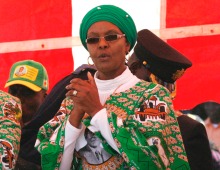There’s a saying that opposites attract, but during the Abantu Book Festival the experience was quite different. The book festival was the platform where book lovers came together to interact with their favourite authors, poets, and like-minded readers.
When I first got the news that I would be covering the festival I was elated, nervous and terrified. I had no knowledge of what to expect, didn’t know what I was going to write about, especially considering that I am still a journalism student and predominantly read prescribed books for academic purposes. “What could I add?” I asked myself.
I spoke to my mentor about how nervous I was about ruining my interviews with authors and participants at the festival. Her words were very encouraging.
“When you get nervous just remember that’s what excitement feels like,” she said.

Attending the official launch of the festival was an experience in and of itself. Soweto Theatre is a piece of artsy architecture, it soothed me, and being amongst the first to arrive at the venue gave me time to explore the monument and afforded me an opportunity to interact with other book lovers.
Once the launch started, the musical performance by the Zuko Collective and the poetry performed by Mxolisi Mtshali introduced me to an indelible experience. I am still riding the emotional rollercoaster it provided, transporting me to imaginary distant lands. Needless to say, I fell in love with the festival.
Official business began on the second day of the festival. Attending workshops and engaging with authors meant my nerves wrecked me once again. Just seeing authors like Nigerian author Chimamanda Ngozi Adichie or Zimbabwean author Novuyo Rosa Tshuma making their way to different sessions was enough to excite me. I was starstruck.

My first recorded chat was with South African poet Diana Ferrus, who was in conversation with journalist Gail Smith about the paths which led them to identifying with the plight of Sara ‘Saartjie’ Baartman, the South African Khoi woman who was taken from her country of birth to be displayed as a freak show attraction in 19th century Europe as the Hottentot Venus. Ferrus wrote a poem, ‘I have come to take you home’ while living in Holland in 1998 and the poem became the catalyst for the return of Baartman’s remains to South Africa.
The interaction with Ferrus about her work was inspirational and I looked forward to talking to more authors after that. Ferrus built up my courage to approach Professor Pumla Gcola, who welcomed the interview even though it was a short one. I even took a selfie with her. Can you blame me?

Another memorable interactions was with the author of Sorry, Not Sorry, Haji Mohamed Dawjee, who formed part of the Breaking the Rainbow session. She really changed my perspective about the rainbow nation myth and how I felt as a young, black body in South Africa. She me realise that I am not unworthy, that I hold the power to shape how my life should be by telling my own story my own way. She made her interview so easy and she has a great sense of humour.
The book festival was filled with so many amazing experiences. I learned so much, I overcame my fear of interviewing authors, I purchased books. The founder and director of Abantu Book Festival Thando Mgqolozana deserves a standing ovation.









